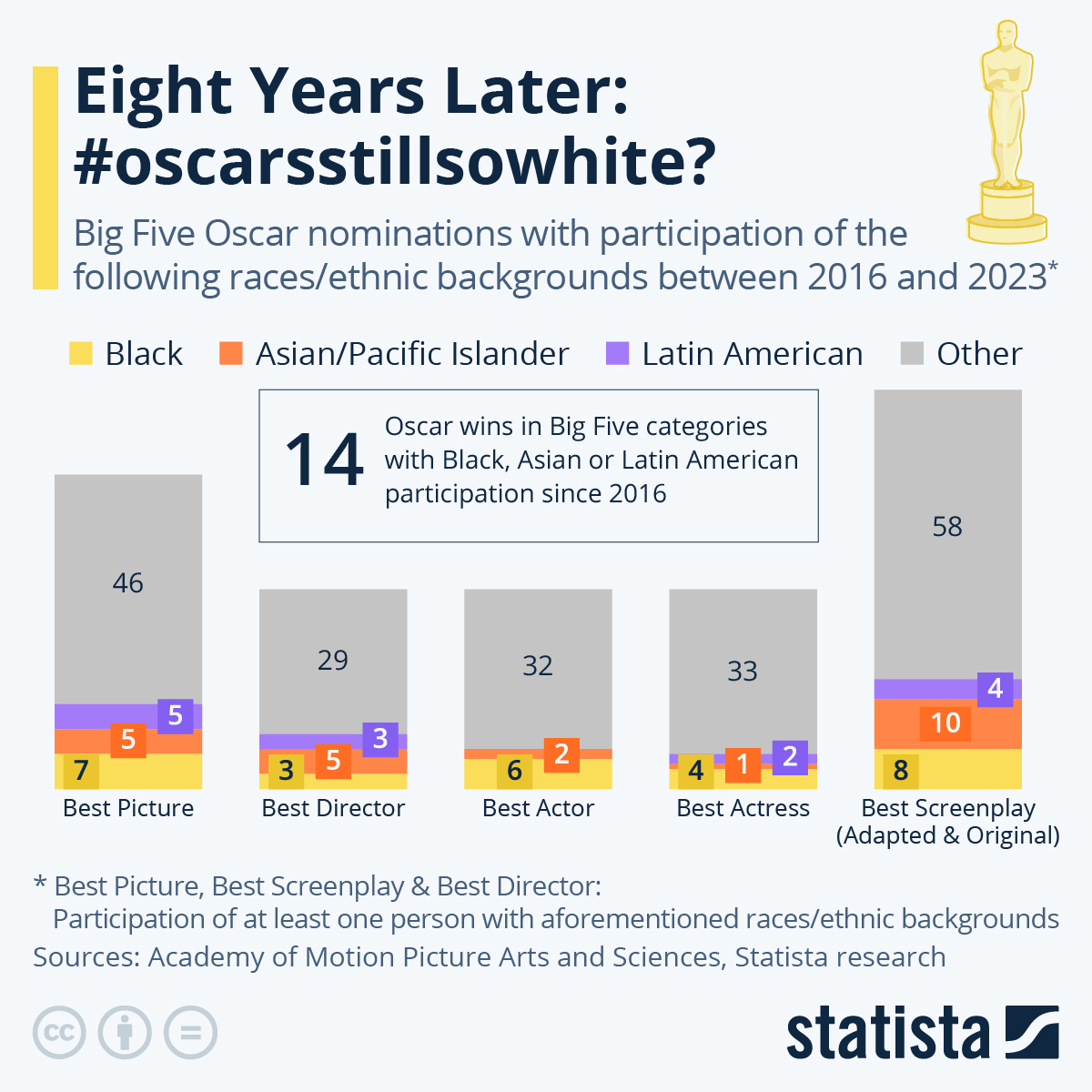
Michelle Yeoh was nominated this week for an Academy Award for her lead role in independent flick Everything Everywhere All at Once. The Malaysian Chinese actress is the first women of Asian descent ever to be nominated in the Best Actress category (when disregarding Natalie Portman who has U.S. and Israeli citizenship) .
However, as Statista's Florian Zandt reports, while the milestone has received widespread coverage, there have also been voices criticizing the lack of black Best Actress nominees this year, showing that eight years after the hashtag #oscarssowhite, the discussion about diversity at the Academy Awards is still ongoing.
You will find more infographics at Statista
Looking at nominations in the Oscar's Big Five categories since the #oscarssowhite controversy, Best Actress is the category where the least Black, Asian and Latin American people (or those with a corresponding family background) have been nominated - just seven out of 40. Best Actor is not far behind at eight out of 40 nomination. This includes last year's nomination and win by Will Smith for his role as the father and coach of Serena and Venus Williams in the sports drama King Richard.
The Big Five, generally seen as the most prestigious categories at the Oscars, grow slightly more diverse in the categories Best Picture, Best Director and Best Screenplay (both adapted and original). Best Director saw 11 nominations in the given time frame, including the nominations and wins of Chloé Zhao for Nomandland, Bong Joon-ho for Parasite, Alfonso Cuarón for Roma and Guillermo del Toro for The Shape of Water between 2017 and 2020. This year, the director duo of Everything Everywhere All at Once, Daniel Scheinert and Daniel Kwan, is nominated in the category and could snag another win with Asian-American participation.
The fact that this share of Oscar nominees doesn't reflect the demographics of the United States and serves to underline the minority status of non-white voices in the movie industry led to the #oscarssowhite movement in 2015, which gained increased traction in 2016 after the Academy allegedly failed to address the concerns voiced by proponents of this movement. The issue that the movie industry doesn't reflect general society has also been backed by research. For example, according to a study by the University of California, 26 percent of movie writers and 25 percent of movie directors had a minority background in 2020, while the group of people with singular Hispanic, Latin American, Black or African American backgrounds alone comprised 31 percent of the U.S. population in the same year.
One group that's particularly absent and isn't talked about at length is actors, directors and writers with a distinctly Arabian background. In 2021, for example, only two films by Arabian filmmakers were nominated, Tunisian director Kaouther Ben Hania’s The Man Who Sold His Skin and The Present by Palestinian filmmaker Farah Nabulsi. In 2018, Egyptian-American actor Rami Malek won Best Actor for his role as Freddie Mercury in Bohemian Rhapsody.
Michelle Yeoh was nominated this week for an Academy Award for her lead role in independent flick Everything Everywhere All at Once. The Malaysian Chinese actress is the first women of Asian descent ever to be nominated in the Best Actress category (when disregarding Natalie Portman who has U.S. and Israeli citizenship) .
However, as Statista’s Florian Zandt reports, while the milestone has received widespread coverage, there have also been voices criticizing the lack of black Best Actress nominees this year, showing that eight years after the hashtag #oscarssowhite, the discussion about diversity at the Academy Awards is still ongoing.
You will find more infographics at Statista
Looking at nominations in the Oscar’s Big Five categories since the #oscarssowhite controversy, Best Actress is the category where the least Black, Asian and Latin American people (or those with a corresponding family background) have been nominated – just seven out of 40. Best Actor is not far behind at eight out of 40 nomination. This includes last year’s nomination and win by Will Smith for his role as the father and coach of Serena and Venus Williams in the sports drama King Richard.
The Big Five, generally seen as the most prestigious categories at the Oscars, grow slightly more diverse in the categories Best Picture, Best Director and Best Screenplay (both adapted and original). Best Director saw 11 nominations in the given time frame, including the nominations and wins of Chloé Zhao for Nomandland, Bong Joon-ho for Parasite, Alfonso Cuarón for Roma and Guillermo del Toro for The Shape of Water between 2017 and 2020. This year, the director duo of Everything Everywhere All at Once, Daniel Scheinert and Daniel Kwan, is nominated in the category and could snag another win with Asian-American participation.
The fact that this share of Oscar nominees doesn’t reflect the demographics of the United States and serves to underline the minority status of non-white voices in the movie industry led to the #oscarssowhite movement in 2015, which gained increased traction in 2016 after the Academy allegedly failed to address the concerns voiced by proponents of this movement. The issue that the movie industry doesn’t reflect general society has also been backed by research. For example, according to a study by the University of California, 26 percent of movie writers and 25 percent of movie directors had a minority background in 2020, while the group of people with singular Hispanic, Latin American, Black or African American backgrounds alone comprised 31 percent of the U.S. population in the same year.
One group that’s particularly absent and isn’t talked about at length is actors, directors and writers with a distinctly Arabian background. In 2021, for example, only two films by Arabian filmmakers were nominated, Tunisian director Kaouther Ben Hania’s The Man Who Sold His Skin and The Present by Palestinian filmmaker Farah Nabulsi. In 2018, Egyptian-American actor Rami Malek won Best Actor for his role as Freddie Mercury in Bohemian Rhapsody.
Loading…







